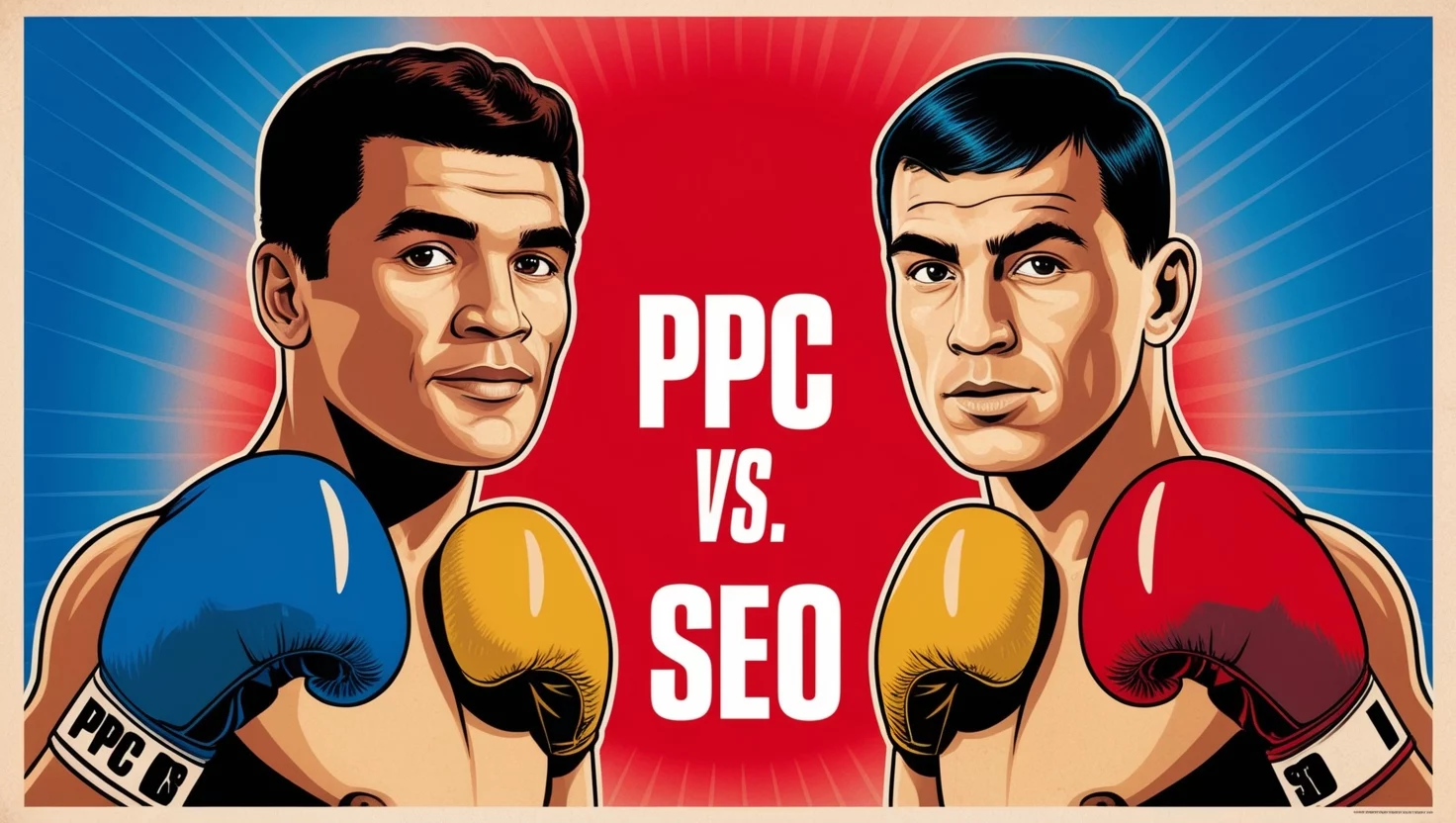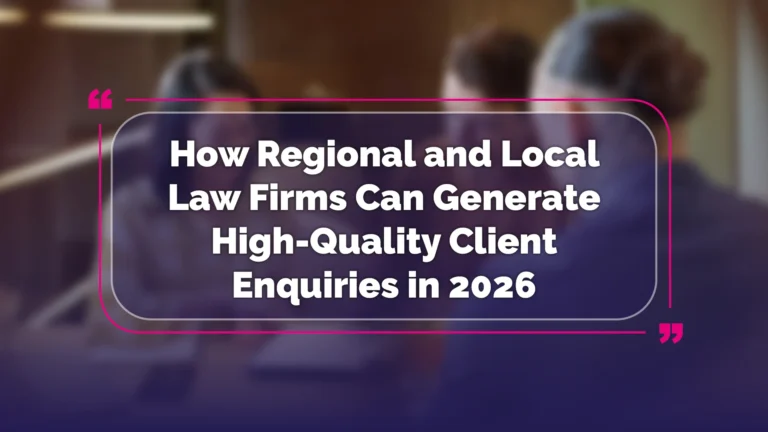In today’s competitive legal landscape, effective marketing for law firms in England and Wales is essential to stand out and attract clients. For many smaller high street practices, the decision often comes down to choosing between two primary digital marketing strategies: PPC (pay-per-click advertising) and SEO (search engine optimisation). Each approach has its merits, but they serve different purposes and come with unique challenges. This article will compare PPC and SEO, exploring their advantages, disadvantages, and best use cases while emphasising the importance of local visibility and sustainable marketing tactics. We’ll also look at how law firms can combine both methods to maximise their overall return on investment.
Understanding PPC and SEO for Law Firm Lead Generation
Before diving into specifics, it’s important to understand how PPC advertising and SEO work in the context of legal marketing. Both strategies aim to boost your online presence, yet they do so in fundamentally different ways.
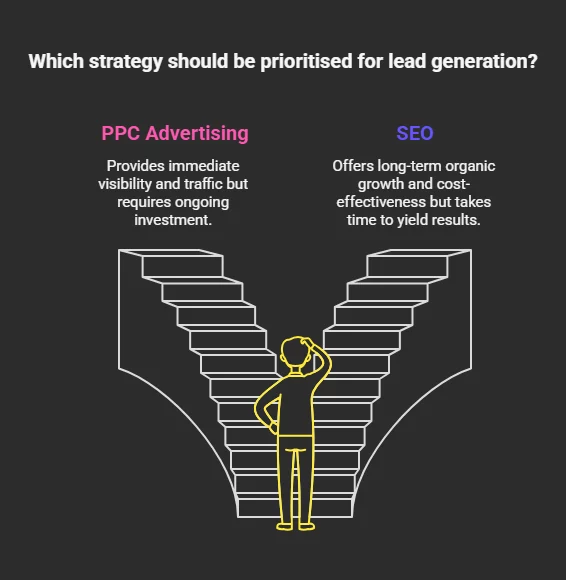

What is PPC Advertising?
Pay-per-click (PPC) advertising allows law firms to pay for ads that appear prominently on search engine results pages (SERPs), social media platforms, or other websites. The most commonly used platform is Google Ads, although Facebook Ads and LinkedIn Ads also provide robust targeting options. For instance, a firm might bid on keywords such as “divorce lawyer near me” or “local personal injury solicitor” to target prospective clients in specific geographic areas. Every time someone clicks on the ad, the firm incurs a cost. The key benefit here is immediate visibility—your ad can appear at the top of search results almost instantly, which is particularly useful when launching a new service or responding to sudden market demand.
In addition to search ads, PPC campaigns can include display ads, remarketing efforts, and even video ads. These varied formats allow law firms to craft messages that speak to different stages of the client journey. For example, a well-designed remarketing campaign might remind visitors who didn’t convert the first time to revisit your website, ensuring that your practice stays top of mind.
What is SEO?
Search engine optimisation (SEO), on the other hand, involves enhancing a law firm’s website and content to rank organically in search results. SEO strategies include creating keyword-rich content, building high-quality backlinks, and improving site speed and mobile-friendliness. When someone searches for phrases like “how to choose a local conveyancing solicitor” or “best family law firm in Birmingham,” a well-optimised website is more likely to appear near the top of the results without paying for each click.
Local SEO is especially critical for law firms because it targets potential clients in your community. Techniques such as optimising your Google My Business profile, gathering positive client reviews, and earning local backlinks all contribute to a stronger local presence. Although SEO takes time to yield results—often several months—it builds a foundation of sustainable, long-term traffic that can reduce your dependence on paid advertising over time.
The Pros and Cons of PPC Advertising for Law Firms
PPC advertising can deliver fast leads, but it’s not without trade-offs. Let’s break down its advantages and disadvantages.
Advantages of PPC Ads
- Immediate Visibility
One of the most significant advantages of PPC is that it places your law firm at the top of search engine results almost immediately. This is particularly useful for time-sensitive campaigns or for new practices that need to generate traction quickly. With geo-targeting options, local law firms can ensure that ads appear to prospective clients in very specific areas, such as certain postcodes or neighbourhoods. - Precision Targeting
PPC platforms offer granular control over who sees your ads. You can target specific audience demographics, locations, and search terms. For example, a criminal defence firm in Leeds might target users who search for “local drug offence solicitor” while excluding terms that might bring in irrelevant traffic. This precision helps in ensuring that your marketing budget is spent on reaching the most relevant and likely-to-convert prospects. - Budget Flexibility
PPC advertising provides excellent budget control. Law firms can set daily or monthly spending limits, making it easier to align campaigns with a predetermined marketing budget. This control is particularly beneficial for smaller practices that need to manage costs carefully while still testing the effectiveness of high-intent keywords. - Enhanced Data and Analytics
In the legal industry, certain keywords such as “medical negligence solicitor” or “employment tribunal lawyer” can be extremely competitive, with costs sometimes exceeding £50 per click. For local firms with limited budgets, these high CPCs can quickly add up and strain resources, making it challenging to achieve a positive return on investment.
Disadvantages of PPC Ads
- High Cost Per Click (CPC)
In the legal industry, certain keywords such as “medical negligence solicitor” or “employment tribunal lawyer” can be extremely competitive, with costs sometimes exceeding £50 per click. For local firms with limited budgets, these high CPCs can quickly add up and strain resources, making it challenging to achieve a positive return on investment. - No Long-Term Value
The benefits of PPC are inherently temporary. Once you stop funding your PPC campaigns, your online visibility disappears almost immediately. This lack of long-term value contrasts with SEO efforts, which can continue to drive organic traffic long after the initial investment in content and optimisation. - Ad Blindness
Many internet users have developed “ad blindness,” a tendency to ignore paid advertisements in favour of organic search results. Even the most carefully targeted PPC ads might suffer from lower click-through rates as users consciously bypass them, opting instead for the results they perceive as more credible. - Competition and Bid Wars
In competitive markets, especially in the legal field, bid wars can drive up the cost of advertising even further. Competing law firms may outbid you for the same keywords, leading to increased costs and sometimes reducing the overall effectiveness of your campaign.
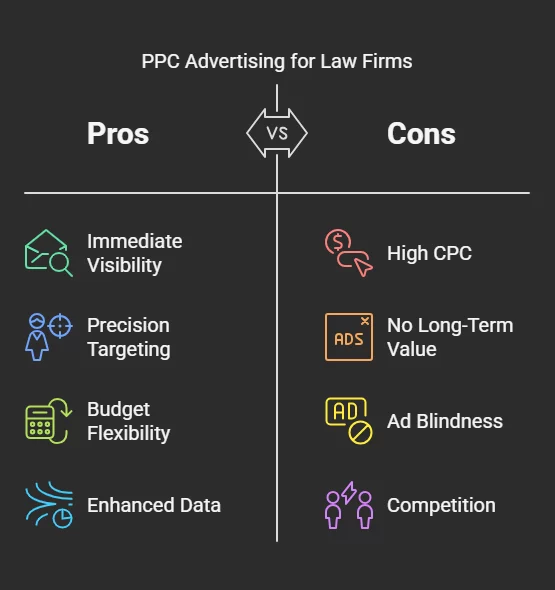

The Pros and Cons of SEO for Law Firms
SEO is widely regarded as a cornerstone of sustainable digital marketing. However, like PPC, it has its own set of advantages and challenges.
Advantages of SEO
- Sustainable, Cost-Effective Traffic
Once your law firm successfully ranks for high-intent keywords like “local probate solicitor” or “commercial lease advice,” you can enjoy a steady stream of organic traffic without the need for ongoing ad spend. Over time, the compounding effect of quality content and backlinks can lead to a dramatic reduction in your cost per lead, making SEO a highly cost-effective strategy in the long run. - Enhanced Credibility
Organic search results are generally viewed as more credible by potential clients. A well-optimised website that ranks naturally in search results signals authority and trustworthiness. For example, a blog post explaining the intricacies of no-fault divorce in the UK can establish your firm as a knowledgeable resource, thereby enhancing your reputation within the community. - Long-Term Visibility
While SEO requires patience, the long-term benefits are significant. Once your website is established as an authoritative source in your niche, maintaining high rankings becomes easier. Regularly updated content, combined with strategic link-building, can keep your website near the top of search results for extended periods—even as market conditions and search engine algorithms evolve. - Local SEO Opportunities
For high street law firms, local SEO offers targeted opportunities that are hard to replicate through PPC alone. By optimising your Google My Business profile, securing local backlinks, and encouraging satisfied clients to leave reviews, you can dominate community-specific searches. This localized approach not only drives traffic but also fosters a sense of community trust and engagement.
Disadvantages of SEO
- Slow Initial Results
One of the primary challenges of SEO is that it does not produce immediate results. It can take anywhere from 6 to 12 months to see a noticeable increase in traffic and search rankings. This slow build-up makes SEO less suitable for firms that need immediate leads or are launching new services that require a rapid market response. - Ongoing Effort Required
SEO is not a “set it and forget it” strategy. To maintain high rankings, law firms must invest in ongoing content creation, technical website improvements, and link-building activities. Additionally, as search engines frequently update their algorithms, your SEO strategy must be agile and adaptive to maintain effectiveness over time. - Unpredictable Algorithm Changes
Search engine algorithms are notorious for their occasional and sometimes unpredictable changes. A sudden update can disrupt your established rankings, leading to temporary or even long-term drops in traffic. This uncertainty requires firms to stay informed about industry trends and be prepared to adjust their strategies as needed. - High Competition for Competitive Keywords
While SEO can be cost-effective, competing for popular keywords in the legal sector is highly challenging. Many law firms are investing in SEO, meaning that achieving top rankings for competitive terms can require significant time, expertise, and resources.
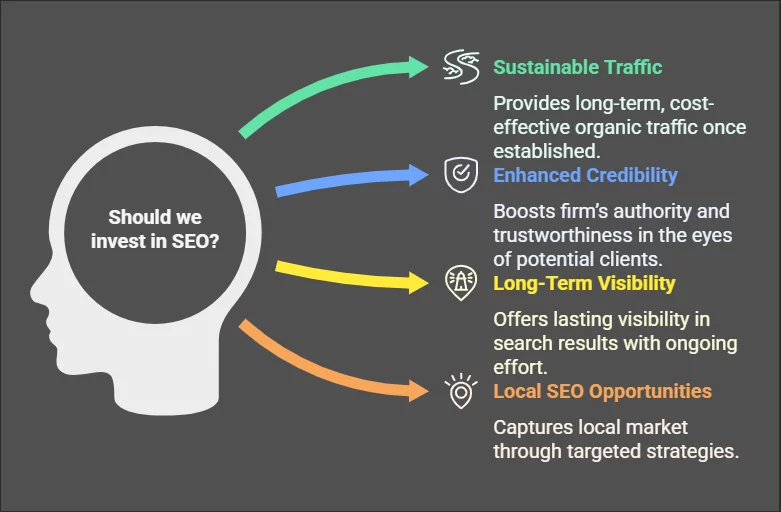

SEO or PPC: Which Should Your Law Firm Prioritise?
Deciding whether to prioritise SEO or PPC largely depends on your law firm’s specific goals, timeline, and marketing budget. Let’s break down scenarios where one might be more advantageous than the other.
When to Choose PPC Advertising
- Urgent Lead Generation
If your law firm needs to generate leads quickly—for instance, if you’re promoting a new service or responding to seasonal demand such as post-holiday divorce inquiries—PPC advertising is the clear choice. The immediacy of PPC can fill the gap while longer-term strategies take shape. - Geo-Specific Campaigns
Local law firms can greatly benefit from the hyper-targeting capabilities of PPC. By tailoring ads to specific towns, cities, or even neighbourhoods, you can ensure that your message reaches the right audience at the right time. - Testing New Markets and Keywords
PPC allows for low-risk experimentation. You can test the viability of new markets or specific keywords before investing heavily in SEO. The instant feedback from PPC campaigns provides valuable insights into what resonates with your target audience, enabling more informed long-term decisions. - Supplementing Seasonal Fluctuations
In the legal industry, demand for certain services can be seasonal. PPC can help balance the lead flow during off-peak times, ensuring that your firm maintains a steady stream of inquiries year-round.
When to Choose SEO
- Long-Term Growth
If your goal is to build organic visibility and reduce reliance on paid advertising, SEO is the way forward. While it may take time to see significant results, the benefits of sustainable, long-term traffic can be substantial. - Budget Constraints
For law firms with limited short-term budgets, the ongoing costs of PPC can be prohibitive. Investing in SEO—even if the initial results are slow—can ultimately lead to lower overall marketing costs as your organic rankings improve and deliver consistent traffic. - Authority and Brand Building
SEO is not just about attracting traffic—it’s also about establishing your firm as an authority in your field. Educational content, detailed service pages, and community-focused blogs all contribute to building a strong brand reputation that can translate into increased client trust and loyalty. - Competitive Differentiation
In highly competitive markets, a robust SEO strategy can differentiate your firm from the competition. High-quality, informative content that addresses the needs of your local community can help you stand out as the go-to resource for legal advice.
Should Law Firms Combine SEO and PPC?
While you may lean toward one strategy based on your immediate needs, many law firms find that a balanced approach—leveraging both PPC and SEO—yields the best results.
- PPC Ads for Short-Term Wins
Use PPC advertising to fill gaps while SEO gains traction. For instance, a local firm launching a new immigration service could run PPC ads for immediate visibility while publishing SEO-optimised guides on visa applications. - SEO for Sustainable Growth
Over time, SEO reduces dependence on paid ads. A family law firm ranking organically for “child custody solicitor near me” can reallocate PPC budget to other campaigns. - Data Synergy
PPC ads provide instant keyword performance data, informing SEO content strategies. Conversely, high-performing SEO keywords can be prioritized in PPC campaigns.
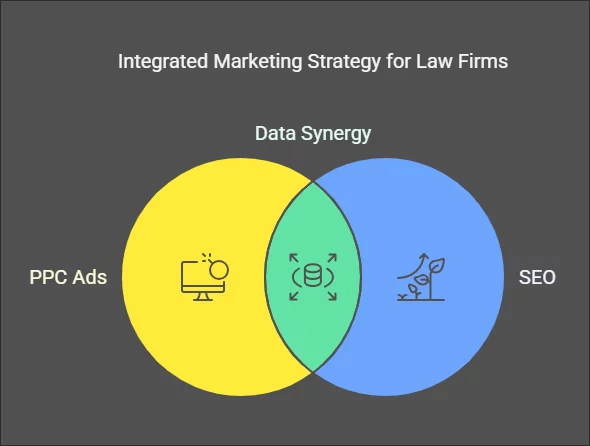

Measuring Success: Key Metrics to Track
Regardless of whether you choose PPC, SEO, or a combination of both, it’s essential to measure the success of your campaigns using the right metrics.
For PPC Campaigns
- Cost Per Lead (CPL): Monitor how much you’re spending on each qualified lead.
- Click-Through Rate (CTR): A higher CTR indicates that your ad copy and targeting are effective.
- Conversion Rate: Track how many clicks result in actual consultations or enquiries.
- Return on Investment (ROI): Evaluate the revenue generated relative to your ad spend.
For SEO Initiatives
- Organic Traffic: Use tools like Google Analytics to monitor changes in organic search traffic over time.
- Keyword Rankings: Track how your targeted keywords perform in search engine results.
- Engagement Metrics: Measure metrics such as time on page, bounce rate, and pages per session to gauge the quality of your content.
- Backlink Profile: Monitor the number and quality of backlinks that point to your website, as these are key indicators of your site’s authority.
Future Trends in Legal Digital Marketing
As technology and consumer behaviour continue to evolve, so too will the strategies that law firms need to adopt. Here are a few trends to watch for in the coming years:
- Voice Search Optimisation
With the rise of voice assistants, optimising your website for voice search is becoming increasingly important. Law firms should consider conversational keywords and FAQs that match natural language queries. - Mobile-First Strategies
Given that many local searches are performed on mobile devices, ensuring that your website is fully optimised for mobile is not just recommended—it’s essential. This includes fast loading times, easy navigation, and mobile-friendly design. - Video Content
Video marketing is on the rise across industries. Law firms can leverage video content, such as client testimonials, Q&A sessions, or explainer videos, to engage potential clients and improve search rankings. - Artificial Intelligence and Personalisation
Advances in AI are making it possible to deliver more personalized content and advertising experiences. Law firms that invest in AI-driven analytics and chatbots may see improved client engagement and conversion rates.
Conclusion: Balancing SEO and PPC in Your Marketing Strategy
For law firms in England and Wales, the debate between SEO and PPC isn’t about choosing one over the other—it’s about finding the right balance that meets your firm’s specific needs. PPC advertising delivers immediate leads and precise local targeting, while SEO builds lasting credibility and organic growth over time. By integrating both strategies, your firm can benefit from the immediacy of PPC while laying the groundwork for sustainable, long-term success through SEO.
Key Takeaways for High Street Firms:
- Use PPC Ads for Urgent Campaigns and Geo-Targeting: PPC is ideal for generating fast leads, testing new keywords, and capturing seasonal demand.
- Invest in Local SEO to Dominate Community-Specific Searches: A robust SEO strategy builds trust and authority while driving sustainable, cost-effective traffic.
- Combine PPC and SEO for Maximum Visibility: Leverage the strengths of each approach by using PPC for immediate data and feedback, then refining your SEO strategy accordingly.
Ultimately, your firm’s marketing success depends on aligning tactics with your budget, goals, and the competitive landscape of your local market. Whether you prioritise SEO, PPC, or a strategic blend of both, a well-informed and adaptive approach will ensure your practice thrives in an increasingly digital world.
By continuously monitoring performance, adapting to industry trends, and staying committed to both immediate and long-term strategies, your law firm can build a robust digital presence that not only attracts but also converts prospective clients into long-term relationships.
Ready to Elevate Your Digital Marketing?
If you’re looking for expert guidance to boost your law firm’s online presence and generate quality leads through tailored PPC and SEO strategies, we’re here to help. At GrowWithQS, we specialise in creating comprehensive digital marketing solutions designed specifically for legal practices. Our team will work with you to develop a strategy that delivers immediate results while building a foundation for long-term success.
Contact us today to learn how we can transform your online marketing strategy and drive sustainable growth for your firm:
https://growwithqs.com/contact/

